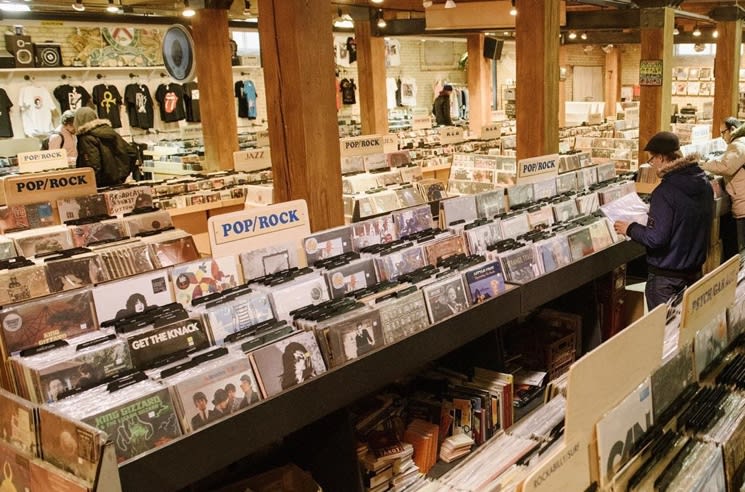Running a record store can be precarious at the best of times. In a post-streaming world, it's a passion project typically reserved for hardcore music lovers and devoted vinyl collectors. Throw in a global pandemic and a near-complete social shutdown, and running a record store suddenly turns from a labour of love into a desperate struggle for survival.
That's the situation independent record stores across Canada find themselves in. Several weeks into the coronavirus lockdown, and with no clear end in sight, indie shops are left trying to wait it out while still generating as much business as they can.
"We basically have zero revenue coming in at all," says Ben Frith of Vancouver's Neptoon Records. "It's really hard, and it's going to be really hard for a while. On top of all of that, such a high percentage of our customers are also out of work, so even though they want to support us, it's pretty much impossible for them to do so."
To make matters even worse, many Canadian vinyl distributors are currently shut, meaning that new records aren't coming in. Pearl Jam's Gigaton should have been a big seller, but shipments haven't arrived. "I probably could have sold 100 of them last week, and that would have really helped a lot of shops," says Frith. He adds that Record Store Day, which has already delayed its usual April event until June, seems unlikely to happen — and even if it did, could shops even afford to buy the inventory?
As records stores close to the public, a key part of the music industry has vanished overnight, and it's having reverberations throughout an arts community that's already hurting. Jeff Barber of Toronto's Sonic Boom points out, "Sonic Boom is part of a microcosm that supports the music community as a whole, and there are so many players in the supply chain that are all affected: the musicians, the artists, writers, designers, labels, distributors and the community itself is threatened. It's truly devastating."
Most independent record stores are trying to make the best of things with alternative purchasing methods. All of the shops we spoke to have ramped up their online efforts, ranging from social media campaigns to Discogs accounts to neighbourhood deliveries. Neptoon has even been offering recommendations for curious customers looking to recreate the exploratory experience of browsing for vinyl. But, despite all these efforts, record stores have lost the thing that previously set them apart from online retailers.
"We'll never be able to capture the true store experience online, that involves too many nuances; the staff interactions, the nostalgic discoveries, playlists, the vibe," admits Barber. "Record stores are tactile, physical spaces, constantly changing, dynamic and buzzing with excitement, and that essence will never be able to be fully actualized in an online shop."
For devoted record shoppers, it's as much about the journey as it is the destination. Many music lovers can happily spend hours browsing through the shelves and speaking with like-minded shoppers and staff members. And if you find a cool record to buy, that's an added bonus.
In this difficult time, silver linings have been hard to find — but they do exist. Frith notes that Neptoon has been reorganizing its stock and going through back inventory, as well as completing long-overdue projects like painting. Alberta's Blackbyrd Myoozik had to lay off ten staff members across its two stores, but online sales have being going well enough that they've managed to partially rebound. "I have rehired another person both in Edmonton and in Calgary to handle the demand," says Blackbyrd's Arthur Fafard.
Additional help may come in the form of federal assistance. Dave Gowans of Red Cat Records notes, "Rents are expensive in Vancouver and we certainly will need to rely on some government help when it becomes available."
That assistance — whether from online purchases by loyal customers, from an altruistic Taylor Swift, or from the government — will be key in ensuring that Canadian independent record stores are able to thrive in a post-coronavirus world.
But those lifelines will only go so far. Ultimately, there's only one way to lift record stores back up on their feet: practice strict physical distancing, slow the spread of COVID-19, and allow restrictions to be lifted sooner rather than later.
"We've been a staple of the music community in Canada for 19 years now, and that legacy is tied fully to our physical shop," says Barber. "We ask the public to listen to the advice of officials — wash your hands, engage in social distancing, and if you're sick or recently returned to Canada, quarantine for 14 days. By following these directives, we can hopefully reopen soon."
That's the situation independent record stores across Canada find themselves in. Several weeks into the coronavirus lockdown, and with no clear end in sight, indie shops are left trying to wait it out while still generating as much business as they can.
"We basically have zero revenue coming in at all," says Ben Frith of Vancouver's Neptoon Records. "It's really hard, and it's going to be really hard for a while. On top of all of that, such a high percentage of our customers are also out of work, so even though they want to support us, it's pretty much impossible for them to do so."
To make matters even worse, many Canadian vinyl distributors are currently shut, meaning that new records aren't coming in. Pearl Jam's Gigaton should have been a big seller, but shipments haven't arrived. "I probably could have sold 100 of them last week, and that would have really helped a lot of shops," says Frith. He adds that Record Store Day, which has already delayed its usual April event until June, seems unlikely to happen — and even if it did, could shops even afford to buy the inventory?
As records stores close to the public, a key part of the music industry has vanished overnight, and it's having reverberations throughout an arts community that's already hurting. Jeff Barber of Toronto's Sonic Boom points out, "Sonic Boom is part of a microcosm that supports the music community as a whole, and there are so many players in the supply chain that are all affected: the musicians, the artists, writers, designers, labels, distributors and the community itself is threatened. It's truly devastating."
Most independent record stores are trying to make the best of things with alternative purchasing methods. All of the shops we spoke to have ramped up their online efforts, ranging from social media campaigns to Discogs accounts to neighbourhood deliveries. Neptoon has even been offering recommendations for curious customers looking to recreate the exploratory experience of browsing for vinyl. But, despite all these efforts, record stores have lost the thing that previously set them apart from online retailers.
"We'll never be able to capture the true store experience online, that involves too many nuances; the staff interactions, the nostalgic discoveries, playlists, the vibe," admits Barber. "Record stores are tactile, physical spaces, constantly changing, dynamic and buzzing with excitement, and that essence will never be able to be fully actualized in an online shop."
For devoted record shoppers, it's as much about the journey as it is the destination. Many music lovers can happily spend hours browsing through the shelves and speaking with like-minded shoppers and staff members. And if you find a cool record to buy, that's an added bonus.
In this difficult time, silver linings have been hard to find — but they do exist. Frith notes that Neptoon has been reorganizing its stock and going through back inventory, as well as completing long-overdue projects like painting. Alberta's Blackbyrd Myoozik had to lay off ten staff members across its two stores, but online sales have being going well enough that they've managed to partially rebound. "I have rehired another person both in Edmonton and in Calgary to handle the demand," says Blackbyrd's Arthur Fafard.
Additional help may come in the form of federal assistance. Dave Gowans of Red Cat Records notes, "Rents are expensive in Vancouver and we certainly will need to rely on some government help when it becomes available."
That assistance — whether from online purchases by loyal customers, from an altruistic Taylor Swift, or from the government — will be key in ensuring that Canadian independent record stores are able to thrive in a post-coronavirus world.
But those lifelines will only go so far. Ultimately, there's only one way to lift record stores back up on their feet: practice strict physical distancing, slow the spread of COVID-19, and allow restrictions to be lifted sooner rather than later.
"We've been a staple of the music community in Canada for 19 years now, and that legacy is tied fully to our physical shop," says Barber. "We ask the public to listen to the advice of officials — wash your hands, engage in social distancing, and if you're sick or recently returned to Canada, quarantine for 14 days. By following these directives, we can hopefully reopen soon."




